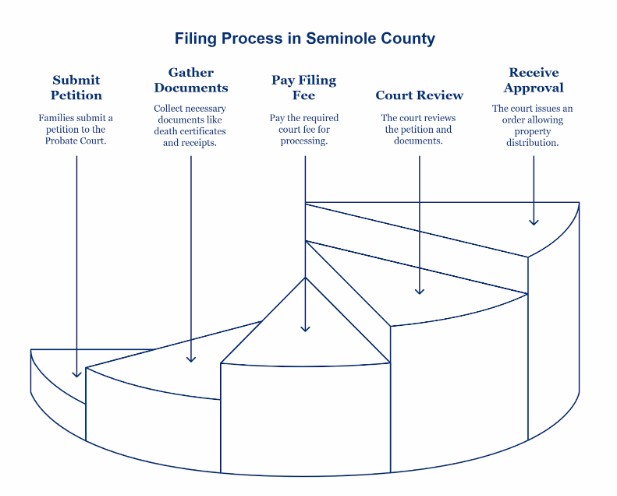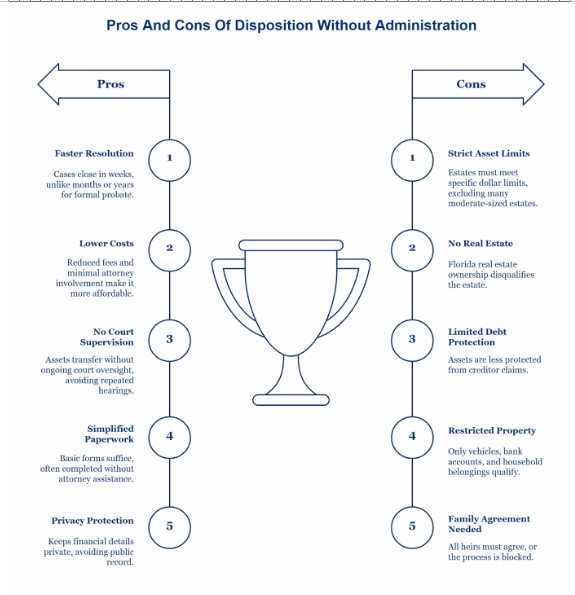

Originally published: September 2025 | Updated: December 2025 | Reviewed by Mary Conte
In Seminole County, Florida, some small estates qualify for the disposition of personal property without administration. This rare process enables heirs to claim certain assets without the need for probate.
The Disposition of Personal Property Without Administration provides a simplified method for transferring small estates without complete probate proceedings in Seminole County.
This streamlined process can save families both time and money during an already difficult period.
Disposition of Personal Property Without Administration is typically used for small estates and provides an expedited method to transfer assets without court supervision.
This process has specific rules regarding what property qualifies and who is eligible to use it. Families can’t use this option if the deceased owned Florida real estate at the time of death.
Understanding when this process applies and having the right paperwork ready can make things a lot smoother.
The process begins with submitting a petition to the probate court in the county where the deceased person lived, along with specific documents that prove entitlement to the property.

Disposition of Personal Property Without Administration is a simplified court process for small estates that lets families transfer a deceased person’s assets without full probate supervision.
This streamlined option works only for estates with limited personal property and no real estate.
Disposition of personal property without administration serves estates with very specific limitations.
This process handles assets up to $6,000 or reasonable funeral expenses paid by the petitioner.
Key Differences:
| Process Type | Asset Limit | Court Supervision | Timeline |
| Disposition Without Administration | $6,000 or funeral expenses | Minimal | 14+ days |
| Summary Administration | $75,000 or less | Moderate | 2-6 months |
| Formal Administration | No limit | Full | 6-12+ months |
The court reviews documents but doesn’t supervise the process like formal probate. Families can’t use this method if the deceased owned Florida real estate at death.
The process requires less paperwork than other types of probate. No inventory or accounting needs to be filed with the court.
The court usually takes at least 14 days to review submitted documents. The court authorizes payment, transfer, or disposition of personal property through a letter or writing under the court seal.
This authorization lets banks and other institutions release assets to the petitioner. Court staff checks that the petitioner meets legal requirements.
They verify that asset values fall within established limits and that the necessary documentation accompanies the petition. The court determines case eligibility before authorizing any property transfers.
If requirements aren’t met, the court may deny the petition or require full probate administration instead.
Families usually choose this process when someone dies with minimal assets and unpaid final expenses.
The person who paid funeral bills or medical expenses from the last 60 days can recover these costs through this procedure.
Common Situations:
This option helps families avoid lengthy probate when estates contain little value.
It provides quick access to funds needed to settle final expenses. The process works well when family members agree on the distribution of assets.
However, if disputes or complex family situations arise, formal probate may be necessary instead.
Conte Mollenhauer Law helps Seminole County families navigate the disposition of personal property without administration quickly and affordably. Protect your time and assets—contact us today to schedule your consultation.
If you’re ready to get started, call us now!
This process applies only when the estate has no real property, assets are exempt, and funds are needed to pay final expenses such as medical bills and funeral costs.
The estate must contain only personal property under certain value limits, with no real estate involved.
Florida Statute 735.301 governs the disposition of personal property without the administration process.
This law allows small estates to skip formal probate proceedings when certain conditions are met. The statute requires that the deceased person’s estate consist only of personal property.
Real estate automatically disqualifies an estate from this simplified process.
Key requirements include:
The court may authorize disposition without a hearing if all requirements are satisfied. Applicants must file an affidavit or letter with the court, explaining their situation.
Real estate ownership completely eliminates eligibility for this process.
The deceased person can’t own any land, houses, condos, or other real property at the time of death. This restriction applies to all types of real estate.
Even a small piece of vacant land disqualifies the entire estate from simplified disposition.
Disqualifying real estate includes:
Personal property attached to real estate may also create complications. Items such as built-in appliances or permanent fixtures typically transfer with real property rather than personal property.
Seminole County allows disposition of assets up to $6,000 or reasonable funeral expenses. This limit applies to the total value of all personal property in the estate.
The $6,000 limit applies to all personal belongings combined, and applicants can’t use this process multiple times to exceed the threshold.
Personal property includes:
Funeral expenses get special treatment under the law. The person who paid the funeral bills can ask for reimbursement, even if it exceeds $6,000, as long as the expenses were reasonable.
Certain assets don’t count toward the $6,000 limit or may be excluded from this process entirely. These exempt items are subject to different legal rules for transfer upon death.
Common exempt assets:
| Asset Type | Why Exempt |
| Joint bank accounts | Automatic survivor rights |
| Life insurance | Named beneficiaries |
| Retirement accounts | Beneficiary designations |
| Payable-on-death accounts | Direct transfer rules |
Assets with named beneficiaries usually transfer automatically. Beneficiaries just contact the financial institution directly instead of going through probate court.
Some personal property might qualify for other simplified procedures. Small estates that exceed the $6,000 threshold but stay under $75,000 could use summary administration instead.

Families must submit a petition to the Seminole County Probate Court, provide a death certificate, receipts for final expenses, and proof of asset ownership.
The filing process requires completing specific forms, gathering required documents, paying the court fee, and waiting for judicial review.
Most cases receive approval within 30-45 days, provided all information checks out.
Seminole County uses a specific petition form for the disposition of personal property without administration.
The online forms section provides access to the current version.
The petitioner needs to complete every section of the form accurately. Missing information will slow things down.
Required form sections include:
The form must match the name exactly as it appears on the death certificate. If there’s a difference, you’ll need extra documentation to explain why.
Several supporting documents must go with the petition. These prove the petitioner’s eligibility and the decedent’s assets.
Mandatory documents:
Property appraisals may be needed if personal property values exceed $1,000. The court requires current market values, not the price you paid for the item years ago.
Beneficiaries who agree to the distribution need to sign consent forms. If someone refuses to sign, they must receive formal court notice.
Seminole County charges a filing fee for disposition petitions. The exact amount changes periodically, so please check before filing.
Payment methods usually include cash, money orders, or certified checks. The court probably won’t take personal checks.
The fee covers the court’s administrative costs and judicial review. No additional fees apply unless an unusual circumstance arises.
If you can’t afford the fee, you can request a waiver by filling out additional financial disclosure forms. The court reviews each request individually.
The court begins processing the petition once it has received all the required documents and fees. Probate administration procedures set the steps for this review.
The initial review typically takes about 2-3 weeks. The clerk checks the forms for completeness and accuracy.
Timeline breakdown:
If the case is complicated—maybe there’s disputed property or someone can’t find a beneficiary—it’ll take longer. Sometimes, the court requests additional information or extra paperwork.
When the court gives the green light, it issues an order that lets property be distributed. This order also provides the petitioner with protection from future claims by creditors or other beneficiaries.
If you’re still unsure whether your loved one’s estate qualifies for disposition without administration, Conte Mollenhauer Law will review eligibility and guide every step. Call us now to schedule.
If you’re ready to get started, call us now!

This streamlined probate process can save a significant amount of time and money, but it also limits the estate size and the types of assets that qualify. Knowing these trade-offs helps families make informed decisions about what to do.
| Pros | Details |
| Faster Resolution | Cases typically close within weeks. Courts often review filings within 14 days—much quicker than months or years required for formal probate. |
| Lower Costs | Reduced court fees, minimal attorney involvement, and fewer filings make this process more affordable than traditional probate. |
| No Court Supervision | Once approved, assets transfer without ongoing oversight. Families avoid repeated hearings and reporting obligations. |
| Simplified Paperwork | Basic forms and affidavits are usually enough. Many families complete filings without needing an attorney. |
| Privacy Protection | Keeps more financial details private compared to formal probate. Less family information becomes part of the public record. |
| Cons | Details |
| Strict Asset Limits | Estates must fall under specific dollar limits for funeral and medical expenses. Many moderate-sized estates won’t qualify. |
| No Real Estate Allowed | Any ownership of Florida real estate disqualifies the estate—even a small parcel makes this process unavailable. |
| Limited Debt Protection | Assets are less protected from creditor claims compared to formal probate, which may affect final distributions. |
| Restricted to Personal Property | Only vehicles, bank accounts, and household belongings qualify—no real estate, no business interests. |
| Family Agreement Required | All heirs must agree. Disputes or objections can block the process entirely. |
Both options help families skip complete probate, but they’re meant for different situations. The main differences primarily stem from estate value, court involvement, and the duration of the process.
Disposition without administration in Florida is subject to stricter rules than summary administration. The estate can’t be worth more than $6,000 for disposition without administration.
Summary administration stretches up to $75,000 in value. If the person died over two years ago, the estate size doesn’t matter.
Key restrictions for disposition without administration:
Summary administration is more flexible. It can handle real estate, bigger estates, and a mix of assets. Summary administration still involves probate and court appearances, unlike disposition without administration.
Disposition without administration only needs a written affidavit sent to the probate court. Filing fees usually stay under $100.
The court reviews everything in about 14 days after you file. They assign a case number and send the documents to a case manager. No court hearings needed.
Summary administration costs more due to attorney fees and court proceedings. Filing fees run from $200 to $400. It takes a few months to finish up.
Timeline comparison:
Families save on legal costs with the more straightforward process. Still, if $5,500 is at stake, summary administration could be easier because disposition without administration can be a hassle.
Most families end up opting for summary administration, as disposition without administration only applies to specific cases. That $6,000 limit rules out many people.
If the estate consists only of bank accounts, personal items, and minor debts, disposition without administration might be a suitable option. This often applies to older relatives who rented and had modest savings.
Summary administration works better for families with homes, bigger accounts, or more complicated assets. It handles situations that disposition can’t touch.
Choose disposition without administration when:
Choose summary administration when:
Although Florida law does not require an attorney for a disposition without administration, Seminole County families often benefit from legal guidance to avoid rejected filings and delays.
Filing these forms without a lawyer entails several risks. People often make mistakes that lead to court rejections.
Common filing errors include:
Court clerks reject incomplete applications, requiring you to start over. This delays the process and incurs additional filing fees.
It’s easy to misunderstand which assets qualify. People sometimes include property that’s too valuable or doesn’t meet the rules. One wrong move can bring the entire application to a halt.
Time delays from errors:
Many self-filers get tripped up by legal jargon in the forms. Terms like “exempt property” or “preferred funeral expenses” can be confusing and cause mistakes.
Attorneys ensure that all documents are completed correctly and filed correctly from the outset. They are familiar with Florida probate law and the requirements for disposition without administration.
Attorney services include:
Lawyers stay current on filing rules and deadlines to ensure compliance. They keep up with any changes that could affect your case.
They also calculate property values correctly and identify which assets are exempt. That way, you avoid rejections from wrong asset classifications or value mistakes.
Documentation benefits:
Lawyers also handle communication with the court clerk’s office. They can answer questions or resolve issues if something arises during the review.
Conte Mollenhauer Law specializes in assisting with Seminole County disposition without administration cases. They handle every part of the filing process, from start to finish.
The attorneys review each case to determine if it qualifies before proceeding. They examine asset values, creditor claims, and who’s entitled as an heir to ensure the process aligns.
Services provided:
The team works closely with the Seminole County Clerk’s office. That local know-how? It really helps dodge county-specific issues or last-minute surprises.
Conte Mollenhauer Law outlines the entire process for families in plain English. They field questions about timelines, paperwork, and what comes next—no legal jargon, just straight answers.
If something unexpected arises during court review, their attorneys step in and resolve it. Need more documentation? They’ll get it together and send it over fast.
Local advantages:
The firm offers transparent, upfront pricing for these services. Families see the costs right away—no hidden fees or endless hourly bills lurking in the background.
Don’t risk delays or rejected filings—Conte Mollenhauer Law makes Seminole County probate processes clear and stress-free. Secure your peace of mind—contact us today to schedule your appointment.
What is the disposition of personal property without administration in Seminole County?
It’s a simplified legal process in Florida that lets heirs claim certain assets without probate if the estate only contains exempt property or funds to cover final expenses.
Who is eligible to use disposition without administration in Seminole County?
Eligibility requires no real estate, only personal property, and assets limited to exempt property or funds needed to pay funeral and medical expenses.
How much does it cost to file a disposition without administration in Seminole County?
Filing fees typically range from $231 to $250, plus any additional costs for certified copies and required documentation.
How long does the process take in Seminole County?
Most cases are reviewed by the probate court within a few weeks, often within 30 days or less, provided all paperwork is submitted correctly.
What documents are required for disposition without administration?
You’ll need a certified death certificate, paid funeral and medical receipts, proof of asset ownership (like account statements), and a completed petition form.
Can real estate be included in disposition without administration?
No. Florida law does not allow real estate or business property to qualify. Only certain personal property can be transferred this way.
Do I need a lawyer for disposition without administration?
While not required, many families choose an attorney to avoid rejected filings, delays, or confusion about asset eligibility in Seminole County.